10 专题十 动词的时态 学案 2025年中考英语语法精讲(人教版)
文档属性
| 名称 | 10 专题十 动词的时态 学案 2025年中考英语语法精讲(人教版) | 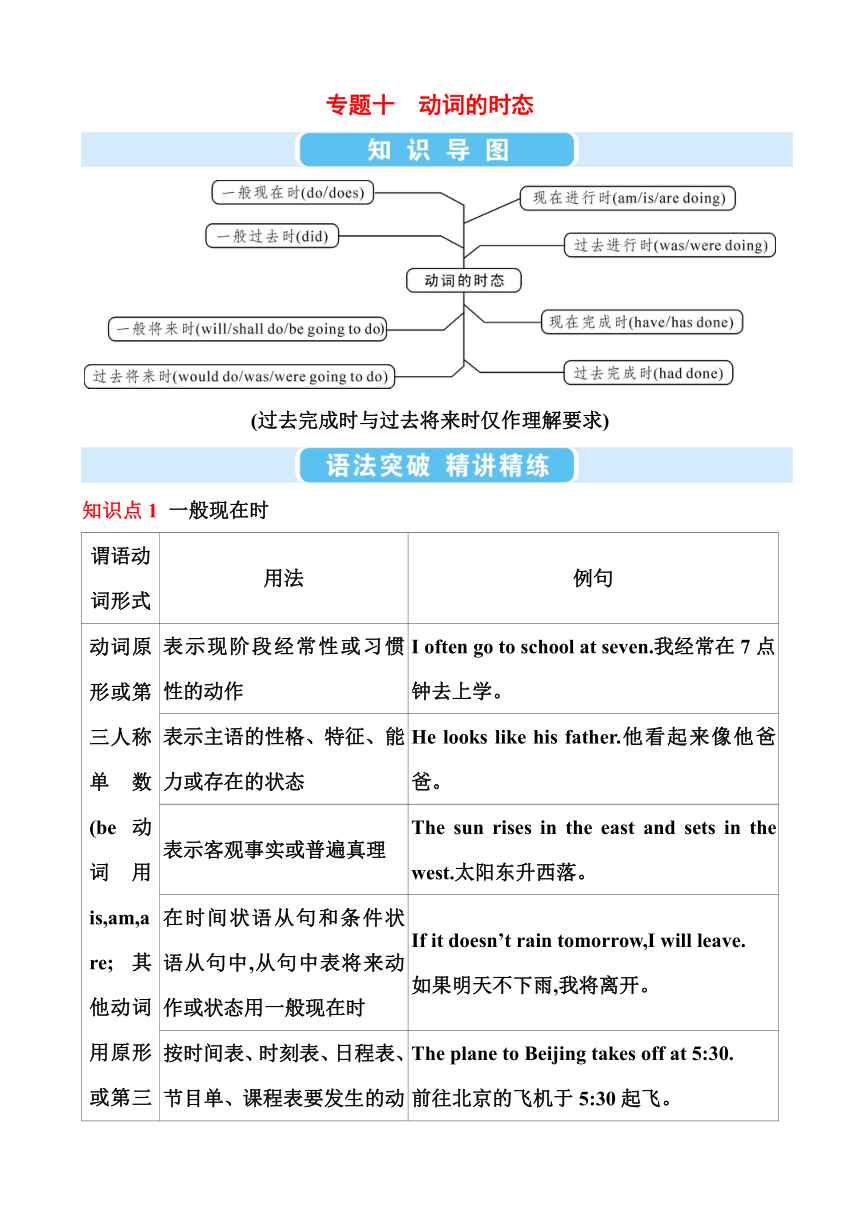 | |
| 格式 | docx | ||
| 文件大小 | 205.2KB | ||
| 资源类型 | 教案 | ||
| 版本资源 | 人教新目标(Go for it)版 | ||
| 科目 | 英语 | ||
| 更新时间 | 2024-12-17 10:46:39 | ||
图片预览

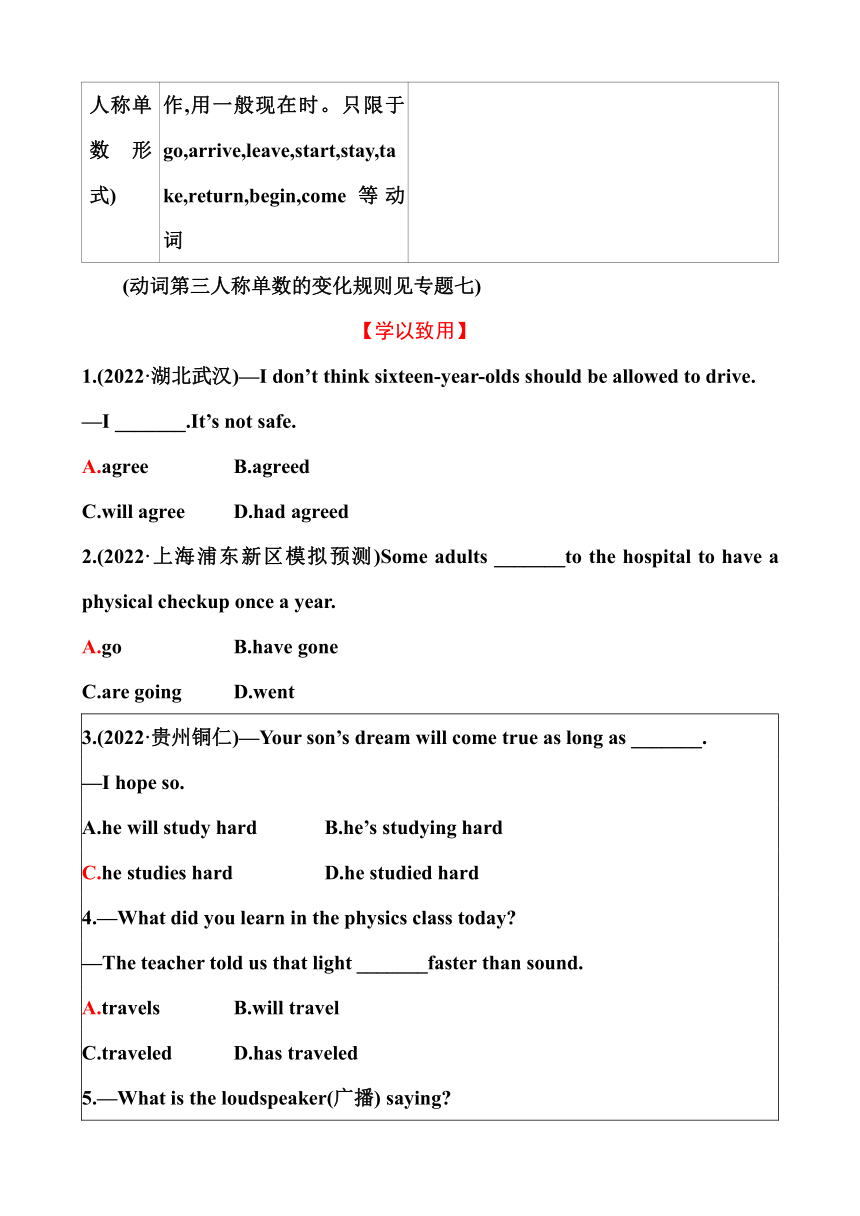
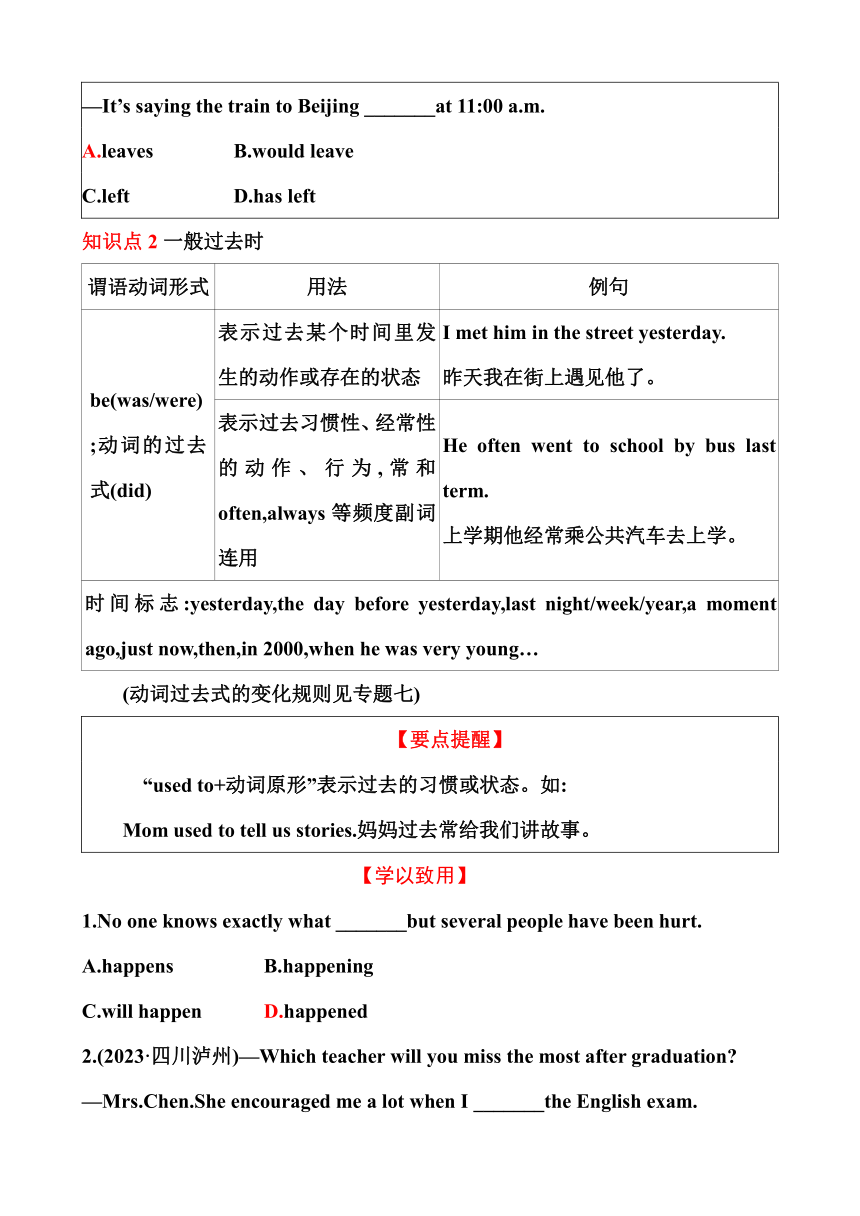
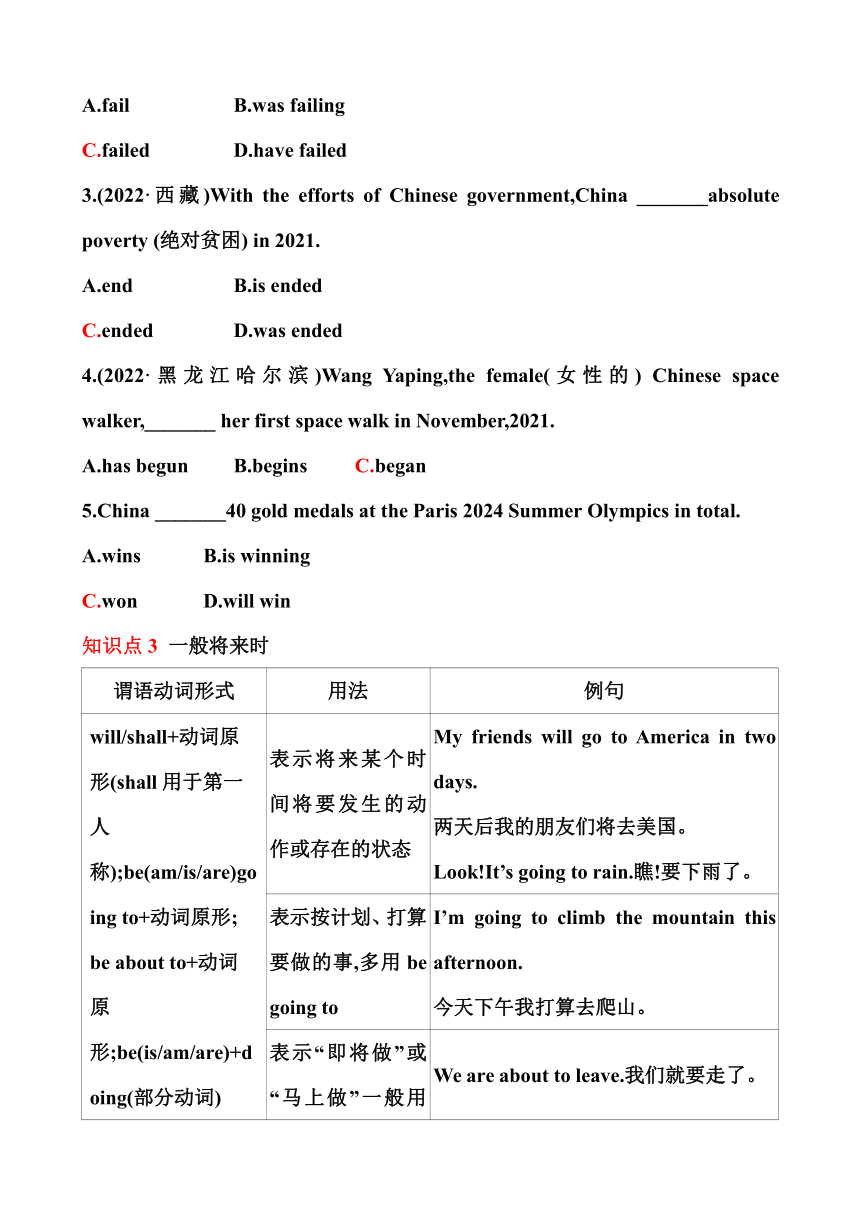
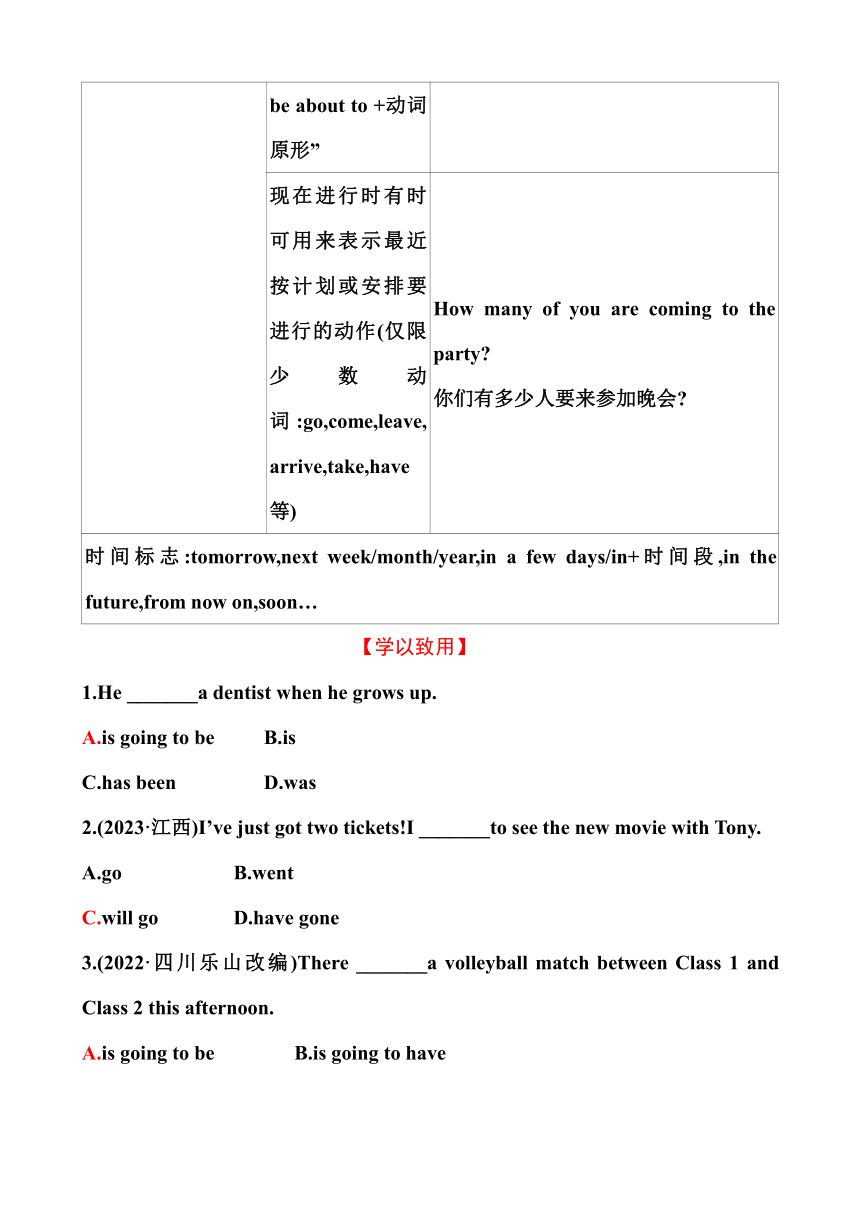
文档简介
专题十 动词的时态
(过去完成时与过去将来时仅作理解要求)
知识点1 一般现在时
谓语动 词形式 用法 例句
动词原形或第三人称单数(be动词用is,am,are;其他动词用原形或第三人称单数形式) 表示现阶段经常性或习惯性的动作 I often go to school at seven.我经常在7点钟去上学。
表示主语的性格、特征、能力或存在的状态 He looks like his father.他看起来像他爸爸。
表示客观事实或普遍真理 The sun rises in the east and sets in the west.太阳东升西落。
在时间状语从句和条件状语从句中,从句中表将来动作或状态用一般现在时 If it doesn’t rain tomorrow,I will leave. 如果明天不下雨,我将离开。
按时间表、时刻表、日程表、节目单、课程表要发生的动作,用一般现在时。只限于go,arrive,leave,start,stay,take,return,begin,come等动词 The plane to Beijing takes off at 5:30. 前往北京的飞机于5:30起飞。
(动词第三人称单数的变化规则见专题七)
【学以致用】
1.(2022·湖北武汉)—I don’t think sixteen-year-olds should be allowed to drive.
—I _______.It’s not safe.
A.agree B.agreed
C.will agree D.had agreed
2.(2022·上海浦东新区模拟预测)Some adults _______to the hospital to have a physical checkup once a year.
A.go B.have gone
C.are going D.went
3.(2022·贵州铜仁)—Your son’s dream will come true as long as _______.
—I hope so.
A.he will study hard B.he’s studying hard
C.he studies hard D.he studied hard
4.—What did you learn in the physics class today
—The teacher told us that light _______faster than sound.
A.travels B.will travel
C.traveled D.has traveled
5.—What is the loudspeaker(广播) saying
—It’s saying the train to Beijing _______at 11:00 a.m.
A.leaves B.would leave
C.left D.has left
知识点2一般过去时
谓语动词形式 用法 例句
be(was/were);动词的过去式(did) 表示过去某个时间里发生的动作或存在的状态 I met him in the street yesterday. 昨天我在街上遇见他了。
表示过去习惯性、经常性的动作、行为,常和often,always等频度副词连用 He often went to school by bus last term. 上学期他经常乘公共汽车去上学。
时间标志:yesterday,the day before yesterday,last night/week/year,a moment ago,just now,then,in 2000,when he was very young…
(动词过去式的变化规则见专题七)
【要点提醒】
“used to+动词原形”表示过去的习惯或状态。如:
Mom used to tell us stories.妈妈过去常给我们讲故事。
【学以致用】
1.No one knows exactly what _______but several people have been hurt.
A.happens B.happening
C.will happen D.happened
2.(2023·四川泸州)—Which teacher will you miss the most after graduation
—Mrs.Chen.She encouraged me a lot when I _______the English exam.
A.fail B.was failing
C.failed D.have failed
3.(2022·西藏)With the efforts of Chinese government,China _______absolute poverty (绝对贫困) in 2021.
A.end B.is ended
C.ended D.was ended
4.(2022·黑龙江哈尔滨)Wang Yaping,the female(女性的) Chinese space walker,_______ her first space walk in November,2021.
A.has begun B.begins C.began
5.China _______40 gold medals at the Paris 2024 Summer Olympics in total.
A.wins B.is winning
C.won D.will win
知识点3 一般将来时
谓语动词形式 用法 例句
will/shall+动词原形(shall用于第一人称);be(am/is/are)going to+动词原形; be about to+动词原形;be(is/am/are)+doing(部分动词) 表示将来某个时间将要发生的动作或存在的状态 My friends will go to America in two days. 两天后我的朋友们将去美国。 Look!It’s going to rain.瞧!要下雨了。
表示按计划、打算要做的事,多用be going to I’m going to climb the mountain this afternoon. 今天下午我打算去爬山。
表示“即将做”或“马上做”一般用be about to +动词原形” We are about to leave.我们就要走了。
现在进行时有时可用来表示最近按计划或安排要进行的动作(仅限少数动词:go,come,leave,arrive,take,have等) How many of you are coming to the party 你们有多少人要来参加晚会
时间标志:tomorrow,next week/month/year,in a few days/in+时间段,in the future,from now on,soon…
【学以致用】
1.He _______a dentist when he grows up.
A.is going to be B.is
C.has been D.was
2.(2023·江西)I’ve just got two tickets!I _______to see the new movie with Tony.
A.go B.went
C.will go D.have gone
3.(2022·四川乐山改编)There _______a volleyball match between Class 1 and Class 2 this afternoon.
A.is going to be B.is going to have
C.are going to have D.are going to be
4.—Would you like to come to have lunch this Sunday
—I’m sorry.I _______the children to the zoo.
A.take B.am taking
C.took D.have taken
5.—You are busy these days
—Yes.The new school year _______.I have to prepare for it.
A.begins B.is about to begin
C.began D.has begun
知识点4现在进行时
【学以致用】
1.—Tom,where is your sister
—Oh, she _______a play by Shakespeare in her bedroom.
A.will read B.reads
C.is reading D.has read
2.(2021·四川凉山)—Don’t make noise!The children _______online.
—Sorry,I won’t.
A.study B.are studying
C.studied D.were studying
3.(2023·河北)Some students _______tai chi over there.Let’s go and join them.
A.play B.played
C.are playing D.were playing
4.—The classroom is so quiet.
—Yes,all the students _______for the final exam.
A.prepare B.prepared
C.will prepare D.are preparing
5.Hurry up!Mr.Brown _______for us in the meeting room at the moment.
A.is waiting B.will wait
C.waited D.has waited
知识点5过去进行时
谓语动词形式 用法 例句
was/were+现在分词(doing) 表示过去某一时刻或某段时间内正在进行的动作(动作发生的时间常用一个短语或时间状语从句来表示) I was watching TV at eight o’clock last night. 昨天晚上八点我正在看电视。 She was reading books all day last Saturday. 上周六她一整天都在看书。
与always,forever等词连用,表示赞扬、厌恶或不满等情感 He was forever complaining about something. 他老是怨这怨那。
时间标志:at that time,at this time yesterday,at 9:00 last night,from nine to ten last night,when/while 引导的时间状语从句等
【学以致用】
1.—Why didn’t you answer my phone last night
—I’m terribly sorry.I _______to a concert and my phone was off at that time.
A.am listening B.listened
C.was listening D.were listening
2.I _______a letter when I received a call from her.
A.write B.was writing
C.wrote D.am writing
3.At this time yesterday,she _______in her office.
A.worked B.would work
C.was working D.works
4.He _______with our teacher when I saw him.
A.was talking B.talks
C.has talked D.will talk
5.—Why didn’t Alice come to the party last night
—Because she _______online classes at that time.
A.takes B.took
C.was taking D.has taken
知识点6现在完成时
谓语动词形式 用法 例句
have/has+ 过去分词 表示过去发生或完成的某一动作对现在造成的影响或结果 I have seen the film already.我已经看过这部电影了。(已知电影内容)
表示过去开始的动作或状态,一直持续到现在乃至将来(谓语常用延续性动词,与so far,since/for…连用) I have studied in the school since 2019. 自从2019年我就在这所学校学习。
时间标志:already,just,yet,so far,up to now,ever,since then,in/during the past…years,“since+过去时间点”,“since+从句(一般过去时)”,“for+时间段”…
(动词过去分词的变化规则见专题七)
【要点提醒】
1.have/has been to,has gone to与have/has been in
(讲解详见第一编八下Units 9—10 知识点1)
2.延续性动词与瞬间性动词
延续性动词和瞬间性动词都可以用在现在完成时中;当现在完成时有时间状语或时间状语从句时,瞬间性动词要转化成对应的延续性动词;瞬间性动词的否定形式可以和一段时间状语连用。如:
He has been away from Wuhan for several years.(此时就是把瞬间性动词leave转化成了be away)
Kate hasn’t left home for three days.凯特已有三天没有出门了。
3.现在完成时与一般过去时的区别
现在完成时强调某一动作或状态对现在造成的影响或结果,不能和表示过去的时间状语连用;一般过去时只表示过去的事实,不表示和现在的关系,可以和表示过去的时间状语连用。如:
I bought a ticket yesterday.我昨天买了一张票。(强调我昨天做的一件事是买票)
I have already bought a ticket.我已经买了一张票。(强调我已经有票了,无须再惦记票的事了)
【学以致用】
1.(2022·四川遂宁)—You dance so well,Alice.
—Thanks.I _______Chinese dance since I was 5 years old.
A.learn B.learned
C.am learning D.have learned
2.(2023·湖北武汉江岸区模拟)So far,high-speed trains _______most of the big cities in China.
A.have connected B.connected
C.will connect D.connect
3.I _______the toy bear since my 6th birthday.
A.have owned B.owned
C.owns D.will own
4.(2022·四川泸州)—Where is Lucy I haven’t seen her for days.
—She _______Chengdu.She’ll be back next week.
A.has gone to B.has been to
C.have gone to D.have been to
5.(2023·四川凉山改编)—Becky,we’re leaving in several minutes.Are you ready
—No,I _______my clothes yet.
A.wasn’t packed B.haven’t packed
C.didn’t pack D.hadn’t packed
(过去完成时与过去将来时仅作理解要求)
知识点1 一般现在时
谓语动 词形式 用法 例句
动词原形或第三人称单数(be动词用is,am,are;其他动词用原形或第三人称单数形式) 表示现阶段经常性或习惯性的动作 I often go to school at seven.我经常在7点钟去上学。
表示主语的性格、特征、能力或存在的状态 He looks like his father.他看起来像他爸爸。
表示客观事实或普遍真理 The sun rises in the east and sets in the west.太阳东升西落。
在时间状语从句和条件状语从句中,从句中表将来动作或状态用一般现在时 If it doesn’t rain tomorrow,I will leave. 如果明天不下雨,我将离开。
按时间表、时刻表、日程表、节目单、课程表要发生的动作,用一般现在时。只限于go,arrive,leave,start,stay,take,return,begin,come等动词 The plane to Beijing takes off at 5:30. 前往北京的飞机于5:30起飞。
(动词第三人称单数的变化规则见专题七)
【学以致用】
1.(2022·湖北武汉)—I don’t think sixteen-year-olds should be allowed to drive.
—I _______.It’s not safe.
A.agree B.agreed
C.will agree D.had agreed
2.(2022·上海浦东新区模拟预测)Some adults _______to the hospital to have a physical checkup once a year.
A.go B.have gone
C.are going D.went
3.(2022·贵州铜仁)—Your son’s dream will come true as long as _______.
—I hope so.
A.he will study hard B.he’s studying hard
C.he studies hard D.he studied hard
4.—What did you learn in the physics class today
—The teacher told us that light _______faster than sound.
A.travels B.will travel
C.traveled D.has traveled
5.—What is the loudspeaker(广播) saying
—It’s saying the train to Beijing _______at 11:00 a.m.
A.leaves B.would leave
C.left D.has left
知识点2一般过去时
谓语动词形式 用法 例句
be(was/were);动词的过去式(did) 表示过去某个时间里发生的动作或存在的状态 I met him in the street yesterday. 昨天我在街上遇见他了。
表示过去习惯性、经常性的动作、行为,常和often,always等频度副词连用 He often went to school by bus last term. 上学期他经常乘公共汽车去上学。
时间标志:yesterday,the day before yesterday,last night/week/year,a moment ago,just now,then,in 2000,when he was very young…
(动词过去式的变化规则见专题七)
【要点提醒】
“used to+动词原形”表示过去的习惯或状态。如:
Mom used to tell us stories.妈妈过去常给我们讲故事。
【学以致用】
1.No one knows exactly what _______but several people have been hurt.
A.happens B.happening
C.will happen D.happened
2.(2023·四川泸州)—Which teacher will you miss the most after graduation
—Mrs.Chen.She encouraged me a lot when I _______the English exam.
A.fail B.was failing
C.failed D.have failed
3.(2022·西藏)With the efforts of Chinese government,China _______absolute poverty (绝对贫困) in 2021.
A.end B.is ended
C.ended D.was ended
4.(2022·黑龙江哈尔滨)Wang Yaping,the female(女性的) Chinese space walker,_______ her first space walk in November,2021.
A.has begun B.begins C.began
5.China _______40 gold medals at the Paris 2024 Summer Olympics in total.
A.wins B.is winning
C.won D.will win
知识点3 一般将来时
谓语动词形式 用法 例句
will/shall+动词原形(shall用于第一人称);be(am/is/are)going to+动词原形; be about to+动词原形;be(is/am/are)+doing(部分动词) 表示将来某个时间将要发生的动作或存在的状态 My friends will go to America in two days. 两天后我的朋友们将去美国。 Look!It’s going to rain.瞧!要下雨了。
表示按计划、打算要做的事,多用be going to I’m going to climb the mountain this afternoon. 今天下午我打算去爬山。
表示“即将做”或“马上做”一般用be about to +动词原形” We are about to leave.我们就要走了。
现在进行时有时可用来表示最近按计划或安排要进行的动作(仅限少数动词:go,come,leave,arrive,take,have等) How many of you are coming to the party 你们有多少人要来参加晚会
时间标志:tomorrow,next week/month/year,in a few days/in+时间段,in the future,from now on,soon…
【学以致用】
1.He _______a dentist when he grows up.
A.is going to be B.is
C.has been D.was
2.(2023·江西)I’ve just got two tickets!I _______to see the new movie with Tony.
A.go B.went
C.will go D.have gone
3.(2022·四川乐山改编)There _______a volleyball match between Class 1 and Class 2 this afternoon.
A.is going to be B.is going to have
C.are going to have D.are going to be
4.—Would you like to come to have lunch this Sunday
—I’m sorry.I _______the children to the zoo.
A.take B.am taking
C.took D.have taken
5.—You are busy these days
—Yes.The new school year _______.I have to prepare for it.
A.begins B.is about to begin
C.began D.has begun
知识点4现在进行时
【学以致用】
1.—Tom,where is your sister
—Oh, she _______a play by Shakespeare in her bedroom.
A.will read B.reads
C.is reading D.has read
2.(2021·四川凉山)—Don’t make noise!The children _______online.
—Sorry,I won’t.
A.study B.are studying
C.studied D.were studying
3.(2023·河北)Some students _______tai chi over there.Let’s go and join them.
A.play B.played
C.are playing D.were playing
4.—The classroom is so quiet.
—Yes,all the students _______for the final exam.
A.prepare B.prepared
C.will prepare D.are preparing
5.Hurry up!Mr.Brown _______for us in the meeting room at the moment.
A.is waiting B.will wait
C.waited D.has waited
知识点5过去进行时
谓语动词形式 用法 例句
was/were+现在分词(doing) 表示过去某一时刻或某段时间内正在进行的动作(动作发生的时间常用一个短语或时间状语从句来表示) I was watching TV at eight o’clock last night. 昨天晚上八点我正在看电视。 She was reading books all day last Saturday. 上周六她一整天都在看书。
与always,forever等词连用,表示赞扬、厌恶或不满等情感 He was forever complaining about something. 他老是怨这怨那。
时间标志:at that time,at this time yesterday,at 9:00 last night,from nine to ten last night,when/while 引导的时间状语从句等
【学以致用】
1.—Why didn’t you answer my phone last night
—I’m terribly sorry.I _______to a concert and my phone was off at that time.
A.am listening B.listened
C.was listening D.were listening
2.I _______a letter when I received a call from her.
A.write B.was writing
C.wrote D.am writing
3.At this time yesterday,she _______in her office.
A.worked B.would work
C.was working D.works
4.He _______with our teacher when I saw him.
A.was talking B.talks
C.has talked D.will talk
5.—Why didn’t Alice come to the party last night
—Because she _______online classes at that time.
A.takes B.took
C.was taking D.has taken
知识点6现在完成时
谓语动词形式 用法 例句
have/has+ 过去分词 表示过去发生或完成的某一动作对现在造成的影响或结果 I have seen the film already.我已经看过这部电影了。(已知电影内容)
表示过去开始的动作或状态,一直持续到现在乃至将来(谓语常用延续性动词,与so far,since/for…连用) I have studied in the school since 2019. 自从2019年我就在这所学校学习。
时间标志:already,just,yet,so far,up to now,ever,since then,in/during the past…years,“since+过去时间点”,“since+从句(一般过去时)”,“for+时间段”…
(动词过去分词的变化规则见专题七)
【要点提醒】
1.have/has been to,has gone to与have/has been in
(讲解详见第一编八下Units 9—10 知识点1)
2.延续性动词与瞬间性动词
延续性动词和瞬间性动词都可以用在现在完成时中;当现在完成时有时间状语或时间状语从句时,瞬间性动词要转化成对应的延续性动词;瞬间性动词的否定形式可以和一段时间状语连用。如:
He has been away from Wuhan for several years.(此时就是把瞬间性动词leave转化成了be away)
Kate hasn’t left home for three days.凯特已有三天没有出门了。
3.现在完成时与一般过去时的区别
现在完成时强调某一动作或状态对现在造成的影响或结果,不能和表示过去的时间状语连用;一般过去时只表示过去的事实,不表示和现在的关系,可以和表示过去的时间状语连用。如:
I bought a ticket yesterday.我昨天买了一张票。(强调我昨天做的一件事是买票)
I have already bought a ticket.我已经买了一张票。(强调我已经有票了,无须再惦记票的事了)
【学以致用】
1.(2022·四川遂宁)—You dance so well,Alice.
—Thanks.I _______Chinese dance since I was 5 years old.
A.learn B.learned
C.am learning D.have learned
2.(2023·湖北武汉江岸区模拟)So far,high-speed trains _______most of the big cities in China.
A.have connected B.connected
C.will connect D.connect
3.I _______the toy bear since my 6th birthday.
A.have owned B.owned
C.owns D.will own
4.(2022·四川泸州)—Where is Lucy I haven’t seen her for days.
—She _______Chengdu.She’ll be back next week.
A.has gone to B.has been to
C.have gone to D.have been to
5.(2023·四川凉山改编)—Becky,we’re leaving in several minutes.Are you ready
—No,I _______my clothes yet.
A.wasn’t packed B.haven’t packed
C.didn’t pack D.hadn’t packed
同课章节目录
- 词法
- 名词
- 动词和动词短语
- 动词语态
- 动词时态
- 助动词和情态动词
- 非谓语动词
- 冠词
- 代词
- 数词和量词
- 形容词副词及其比较等级
- 介词和介词短语
- 连词和感叹词
- 构词法
- 相似、相近词比较
- 句法
- 陈述句
- 一般疑问句和否定疑问句
- 特殊疑问句及选择疑问句
- 反意疑问句
- 存在句(There be句型)
- 宾语从句
- 定语从句
- 状语从句
- 主谓一致问题
- 简单句
- 并列句
- 复合句
- 主谓一致
- 主、表语从句
- 名词性从句
- 直接引语和间接引语
- 虚拟语气
- 感叹句
- 强调句
- 倒装句
- 祈使句
- 句子的成分
- 句子的分类
- 题型专区
- 单项选择部分
- 易错题
- 完形填空
- 阅读理解
- 词汇练习
- 听说训练
- 句型转换
- 补全对话
- 短文改错
- 翻译
- 书面表达
- 任务型阅读
- 语法填空
- 其他资料
